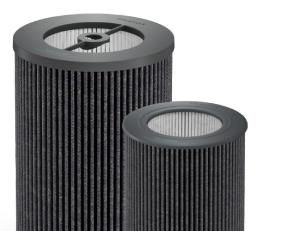The idea that air pollution affects your health is nothing new. We have decades of research supporting the relationship between air pollution levels and respiratory problems, heart conditions, and other physical health issues. It’s only in the past 10 years or so that we’ve started to investigate and understand the role that air pollution can play in a person’s mental health.
When you breathe in polluted air, microscopic pollution particles can enter your bloodstream through your lungs. As your heart pumps your blood around your body, these pollutants get to take a tour around your internal organs—including your brain.
Current research suggests that air pollution exposure can cause significant physical and functional changes in the parts of your brain that are in charge of emotion regulation, including the hippocampus, amygdala, and prefrontal cortex. It may also lead to inflammation in other parts of your body and affect your brain’s ability to regulate neurotransmitters (the chemical messengers that keep your body’s processes running smoothly).
Read on for a closer look at the different ways that air quality can affect mental health.

1. Air pollution makes psychological problems worse.
The changes that happen to your brain when you’re exposed to air pollution may make symptoms of anxiety, depression, and other mental health conditions more severe. In a 2022 systematic review of over 100 medical studies that explore the link between air pollution and mental health, including studies on animals and humans, almost all (95%) observed some effect of air pollution on the brain. About three-quarters of the studies found that mental health symptoms tend to increase with air pollution levels and that the impact can be seen even at levels considered “safe” by the Environmental Protection Agency. On top of that, exposure to air pollution may even increase your chances of developing anxiety and depression in the first place.
When air pollution gets worse in an area, local hospitals see an increase in emergency room visits related to psychiatric diseases. And the effects of air pollution don’t go away immediately after the air quality improves. One study found that women were likely to go to the hospital for psychiatric reasons during bad air quality events or 1 day after. Men were more likely to need a psychiatric ER visit 1 to 2 days after exposure to poor air quality. (The relationship between sex and psychiatric ER visits during air quality events may be due to a few factors, including differences in respiratory passage size, how the body reacts to pollutant exposure, and level of comfort with seeking help for mental health issues.) Another study found that hospitalizations for depression could spike as late as 5 days after exposure to high levels of fine particulate matter (PM2.5) pollution.
Suicide and suicide attempts are also more common during bad air events, and long-term exposure to poor air quality may increase a person’s lifetime risk of depression, substance use, and suicide.
Bottom line: If you think your anxiety, depression, or other mental health condition is getting worse during times of poor air quality, don’t brush it off. When wildfire smoke or other air quality issues impact your area, indicators of flagging mental health from yourself, friends, loved ones, or co-workers should be taken seriously.
The 988 Suicide & Crisis Lifeline provides free prevention and crisis resources and 24/7 free, confidential support for people in distress. For help, you can visit their website or dial 988 on your phone.

2. Air pollution makes it harder to think.
Mental health conditions, such as depression, ADHD, bipolar disorder, anxiety, and addiction, already affect brain function by making it harder to focus and retain information. When you add air pollution to the mix, keeping your brain on task can get even more difficult. Even if you don’t have a psychiatric condition, you may still find yourself struggling to think, concentrate, or be productive when the air is thick with wildfire smoke or other forms of pollution. Some studies demonstrate school and work performance and productivity fall when air pollution increases.
Poor air quality has been linked to slower response times and lower scores on cognitive tests. In a 2022 study that looked at the effects of wildfire smoke on brain function, researchers used scores for over 10,000 adults in the western U.S. on an attention-oriented brain-training game and compared them against reported particulate levels for the day and hour played. Heavier wildfire smoke the day before gameplay was associated with a reduction in final score. These findings showed the cognitive effects of smoke affected scores for at least a day after exposure, and higher levels of smoke exposure were associated with larger score decreases.
Even at low levels of exposure, PM2.5, nitrogen dioxide (NO2), and black carbon—all found in smoke from wildfires, vehicle exhaust, and other forms of combustion—can cause significant decreases in cognitive performance. As little as 1 μg/m3 increase in PM2.5 has been associated with a measurable decline in brain performance functions, including verbal fluency (speaking accurately) and executive function (planning for the future).
Cognitive decline from air pollution may cause a wide range of effects, such as inability to recall. So, don’t be too hard on yourself if you're having trouble concentrating or getting your words jumbled up on a bad air quality day—it’s not your fault. It’s harder for the brain to do its thing when it’s fighting the effects of air pollution, but things should get back to normal soon after air quality improves.
Looking for a way to help combat the cognitive effects of air pollution and improve brain function? Try spending time in green spaces, like parks or hiking trails, on days when air quality permits.

3. Air pollution may impact your brain before you’re born.
There’s no shortage of information online about how different substances can affect an unborn baby during pregnancy—from the obvious ones, like alcohol and nicotine, to the more controversial ones, like caffeine and hair dye. And then there’s air pollution. Pregnant people are especially vulnerable to the harmful health effects of air pollution, and it’s generally accepted that exposure during pregnancy can increase the risk of low birth weight, preterm birth, and other pregnancy complications. That’s why the CDC recommends taking extra care to protect yourself from wildfire smoke (or other bad air events) during pregnancy.
Now, researchers are looking into the link between prenatal air pollution exposure and childhood mental and behavioral health issues. While we don’t know exactly how prenatal air pollution exposure affects brain development, there are a few mechanisms that may come into play. When pollutants get into the placenta, they may cause oxidative stress and inflammation in the brain that affects development. They may also alter the behavior of certain types of brain cells, which can impact how the brain processes and stores information between early childhood and puberty.
Air pollution and autism spectrum disorder
Research suggests that children are more likely to display behaviors typically associated with autism spectrum disorder (ASD) if they were exposed to air pollution before birth. In a 2022 study, researchers from the University of Southern California School of Medicine and Kaiser Permanente found that exposure to PM2.5 in the first and second trimesters was associated with an increased risk of ASD in children, and boys with prenatal PM2.5 exposure had the highest ASD risk. There’s also evidence that the severity of childhood ASD symptoms may increase with higher prenatal PM2.5 exposure.
Air pollution and ADHD, learning difficulties, and other developmental issues
When air pollution affects fetal brain development, it can also lead to other mental health and developmental issues during childhood and beyond. Exposure to high levels of air pollution during pregnancy (especially in the second and third trimesters) has been linked to decreased motor skills, slower cognition, and trouble with language by age 2. Likewise, exposure to PM10, PM2.5, and NO2 during late pregnancy was associated with increased risk of hyperactivity and other ADHD-like behaviors by age 3 in a study evaluating children in Shenzhen City, China.

4. Air quality emergencies are scientifically scary.
As air quality emergencies like wildfires occur more often and affect larger areas, it’s natural to worry about how your life may be impacted by the next disaster. When you live through an extreme air quality event, it can change the way you think about things. For some, it may increase symptoms of depression or other mental health issues. For others, it may lead to excessive or uncontrollable worrying, making it hard to move on from the event and enjoy your life. These effects are likely to be worse for those who experienced more days in which the air quality was significantly affected by wildfire smoke.
It’s also common to experience heightened anxiety and depression, as well as a lack of motivation after experiencing an air quality emergency. Vulnerable populations, including children, older adults, pregnant people, and those with lower incomes, preexisting health conditions, outdoor occupations, housing insecurity, and higher levels of social isolation, are likely to be more impacted by these mental health effects.
Community and social support are vital in the wake of wildfires and other traumatic environmental disasters. Having strong social connections with people in your community has been shown to decrease distress and increase resilience in the 12 to 18 months after the event. Banding together and advocating for each other’s needs can create a sense of identity, support, stability, and fellowship that can be invaluable as you recover and start to rebuild.
To learn more about the effects of wildfire smoke and how to protect yourself, check out our posts on How Wildfire Smoke Changes the Way You Behave and 5 Tips to Protect Yourself From Wildfire Smoke.
Header photo of Woman with a mask on by Yaroslav Danylchenko, Photo of woman on bed by cottonbro studio, photo of man sitting at table by Monstera, photo of newborn baby by Vicki Yde, photo of fire on the road by Marcus Kauffman on Unsplash












